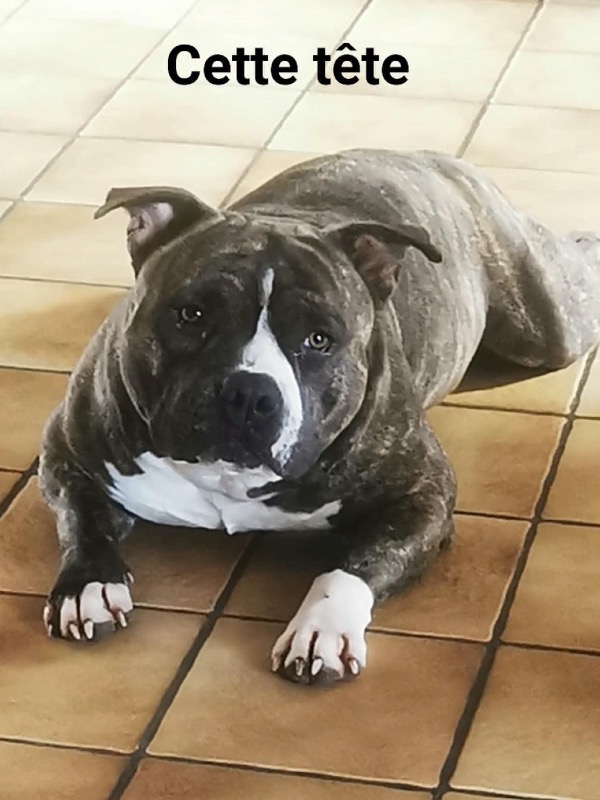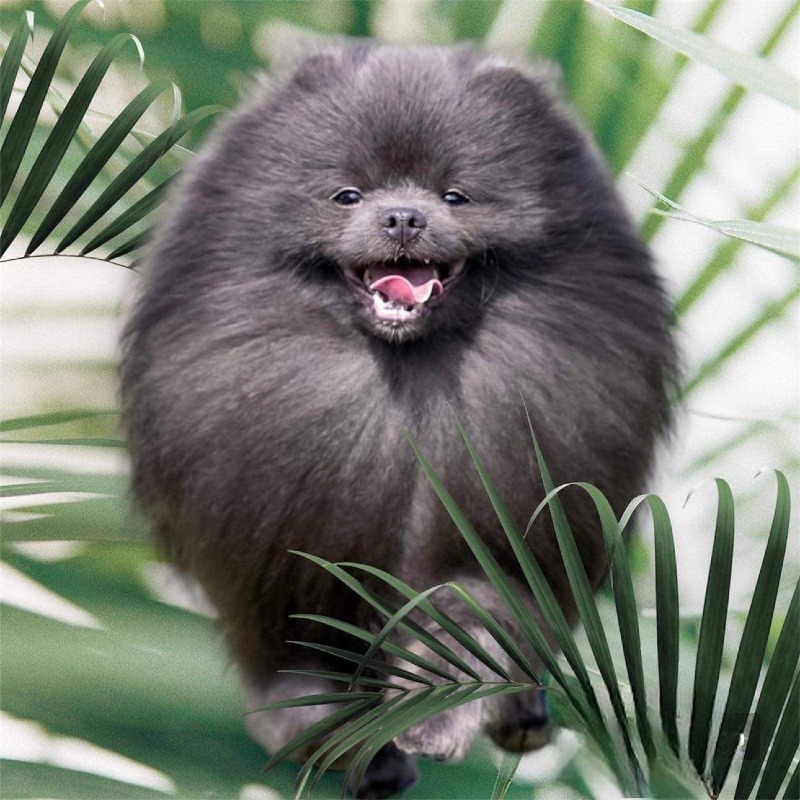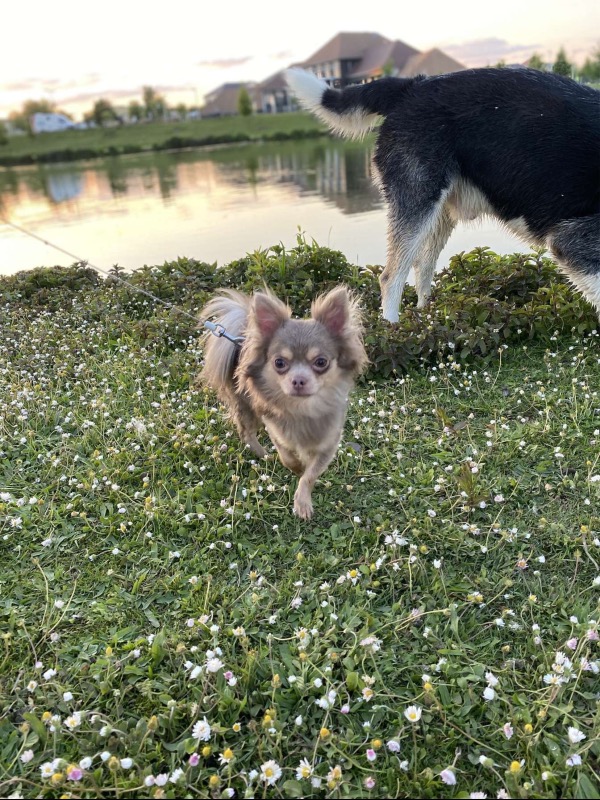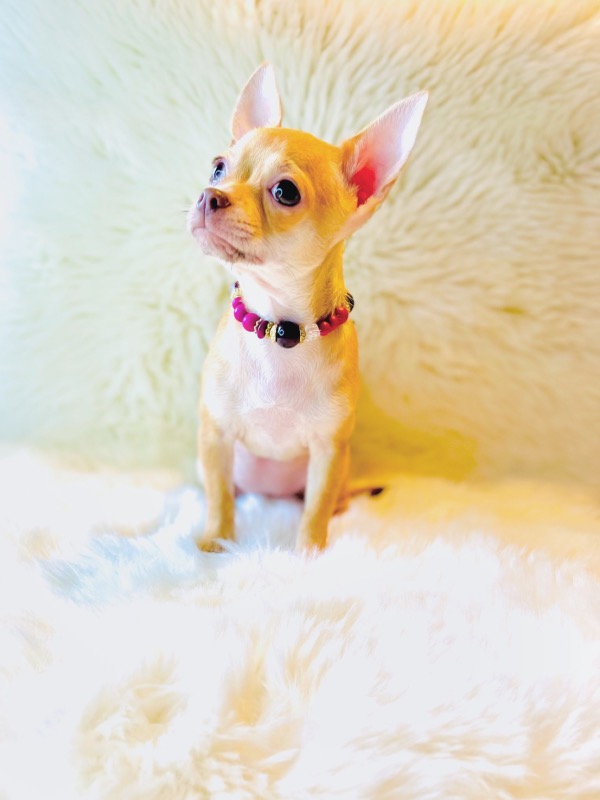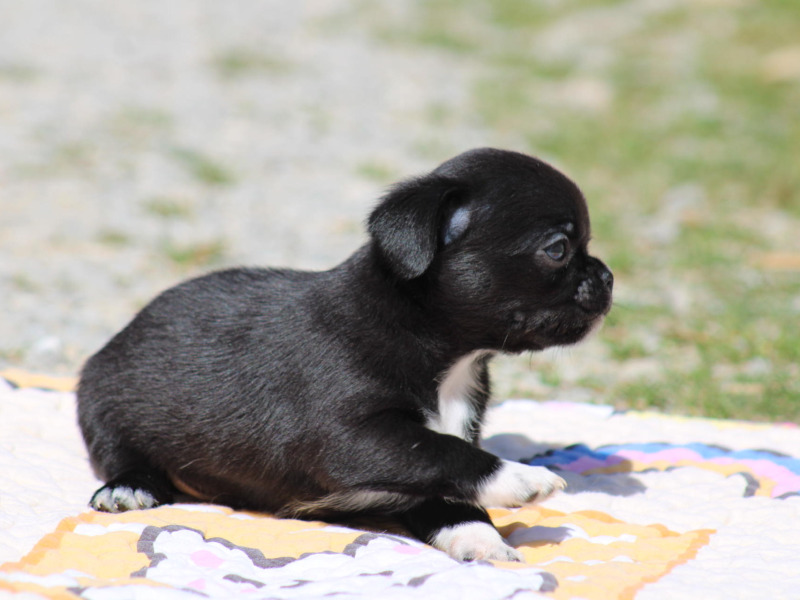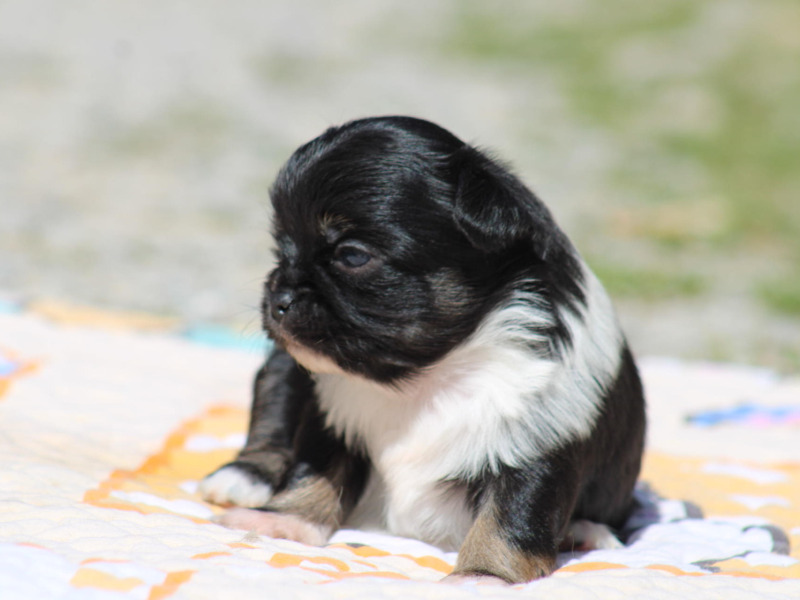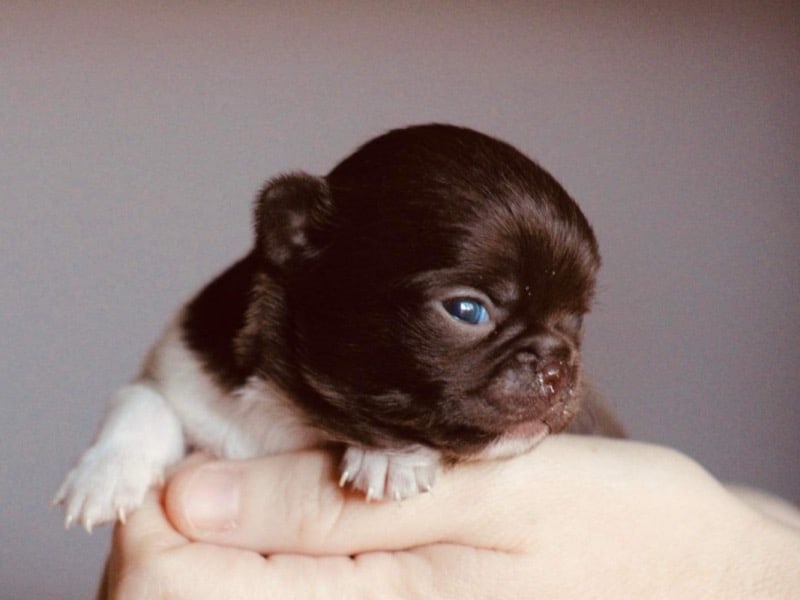Chihuahua
Autres noms : Toy, Toy dog, Chichi, Chiwawa
Discover the Chihuahua, a miniature dog breed with a charming character and overflowing energy. With its small size and bold personality, it is the ideal companion for those seeking a loyal and lively friend.
Awareness of acquiring an animal
Adopting or breeding a dog is a responsibility that must be carefully considered. Dogs are loyal companions that require time, attention, and constant care. Whether for leisure, passion, or professional breeding, it is crucial to understand the specific needs of each breed. Provide them with a loving and stimulating environment, and avoid any impulsive acquisition that could harm their well-being. Be a vigilant and committed owner for a happy and healthy companion.
To learn more about animal welfare, we invite you to consult our FAQ by clicking the button below:
Origins and history
The Chihuahua is a dog breed native to Mexico, more specifically from the state of Chihuahua, from which it gets its name. The earliest traces of this dog date back to pre-Columbian times, where it was bred by indigenous civilizations, such as the Toltecs and the Aztecs. These peoples domesticated a small-sized dog that played an important role in their culture, both as a companion animal and in spiritual and religious rites.
In the 19th century, interest in this breed emerged among tourists and adventurers visiting Mexico. It was during this time that it began to be exported to other countries, including the United States. The official recognition of the breed by kennel clubs occurred in the 1900s. Since then, the Chihuahua has gained popularity due to its affectionate nature, compact size, and distinctive appearance.
Today, the Chihuahua is one of the most popular dog breeds in the world. Its unique characteristics and temperament make it an excellent companion, suited to various lifestyles. Enthusiasts of this breed appreciate its liveliness and attachment to its owner, while being aware of its needs for socialization and training.
Physical characteristics
The Chihuahua is a dog breed known for its small size and distinctive appearance. Its weight typically ranges between 1.5 and 3 kg, and its height is about 15 to 23 cm at the shoulder. These characteristics make it one of the smallest breeds in the world. Their body is compact and well-proportioned, with a slender silhouette that contributes to their agility.
The head of the Chihuahua is often described as apple-shaped, characterized by a slightly rounded skull and a short muzzle. The eyes, large and expressive, are generally round and can be of various shades, ranging from black to light brown. Its ears are often large and erect, giving it an alert and curious expression.
The Chihuahua's coat can be either smooth or long, offering a wide range of colors and patterns, including black, white, chocolate, and various combinations. The texture of the hair, depending on the variety, can be soft and silky or denser. The tail is also a notable feature, often of medium length and can be carried curled over the back. In summary, the Chihuahua stands out for its unique charm and nice physical traits.
Character
The Chihuahua is a dog breed renowned for its small size, but its character is equally rich. These dogs are often described as being very attached to their owners. They form strong bonds and cherish moments of closeness, thereby strengthening their relationship with humans. This loyalty makes them ideal companions, ready to provide comfort and protection to their family.
Despite their small stature, Chihuahuas possess a large personality. They can be fearless and courageous, not hesitating to confront larger dogs. This bravery can sometimes manifest as protective behavior, where they defend their territory or loved ones against intruders. However, this attitude can lead to a tendency toward dominance, which requires consistent and firm training to ensure good behavior.
Naturally sociable, these dogs enjoy the company of other animals and humans. However, it is essential to socialize them early to prevent shy or fearful behaviors. Chihuahuas can also exhibit a strong degree of curiosity. They love to explore their environment, making them active companions that require mental and physical stimulation. In short, this breed combines affection, fearlessness, and curiosity, making it a popular choice for those looking for a unique companion.
Life expectancy
The life expectancy of a Chihuahua is generally between 12 and 20 years, making it one of the most long-lived breeds. Several factors influence this longevity, including genetics, diet, exercise, and veterinary care.
Genetics plays a crucial role in the overall health of each individual. Chihuahuas can be predisposed to certain hereditary diseases, such as heart problems, eye disorders, and dental issues. Therefore, it is essential to choose a responsible breeder who conducts health tests on their breeding stock.
A balanced and quality diet also contributes to extending the lives of these animals. Owners must ensure they provide nutrients suited to their pet's age and specific needs. Additionally, regular exercise is necessary to maintain ideal weight and prevent obesity, which can lead to various health problems.
Finally, regular visits to the veterinarian for preventive check-ups are essential. These consultations allow for the early detection of potential health issues and ensure an optimal quality of life for the Chihuahua throughout its life. By focusing on these elements, it is possible to optimize lifespan and ensure the well-being of this pet.
Exercise and activity needs
Chihuahuas, although they are small in size, have specific exercise and activity needs. Due to their energy, it is essential to regularly stimulate them to maintain their physical and mental health. A daily walk of about 20 to 30 minutes is generally enough to meet their needs. This can include playtime where they can expend energy, which contributes to their well-being.
It is recommended to incorporate interactive games into their daily routine. Push, pull, or fetch toys are ideal for chihuahuas. These activities not only promote exercise but also strengthen the bond between the dog and its owner. Play sessions in a secure environment, like a fenced yard, can also be beneficial.
Finally, although chihuahuas are often perceived as lap dogs, it is crucial not to neglect their physical needs. Insufficient stimulation can lead to undesirable behaviors, such as anxiety or hyperactivity. By adequately meeting their exercise needs, these dogs can lead happy and balanced lives.
Recommended diet
The diet of a Chihuahua must be carefully balanced to meet its specific health and metabolic needs. Due to their small size, these dogs have different nutritional requirements compared to larger breeds. It is essential to choose food specially formulated for small dogs, rich in high-quality proteins and healthy fats, to support their energy and growth.
Chihuahuas are sensitive to certain food allergies, so it is advisable to prioritize natural ingredients and avoid food containing fillers such as corn or wheat. Proteins from sources such as chicken, beef, or fish should form the basis of their diet. Additionally, adding omega-3 and omega-6 fatty acids is beneficial for maintaining healthy skin and a shiny coat.
Hydration is equally important. It is essential to provide fresh and clean water at all times. For meals, one can consider offering kibble specifically designed for their size, which helps with dental health, or homemade recipes, ensuring that the necessary nutritional requirements are met. Lastly, it is recommended to consult a veterinarian to adjust the diet according to the Chihuahua's age, weight, and activity level, to ensure their long-term health and well-being.
Training and obedience
The education and training of Chihuahuas require a specific approach due to their size and temperament. Although these dogs are small, they often have a big personality. This means that owners must quickly establish clear and consistent rules. Early socialization is crucial for Chihuahuas. They need to be exposed to different environments, people, and other animals from a young age to help them become well-balanced adults.
Positive reinforcement methods are particularly effective with this breed. Reward appropriate behaviors with treats or verbal praise to encourage learning. Avoid harsh training methods, as this can lead to fear or anxiety. Patience is essential; Chihuahuas can be stubborn, but with a gentle and consistent approach, they can learn quickly.
Finally, it's important to keep training sessions short and engaging, as these dogs can easily lose focus. With the right guidance, a Chihuahua can become a well-behaved and sociable companion.
Behavior with children
The Chihuahua is a breed of dog that exhibits varied behavioral traits, particularly when it comes to children. While they can be loyal companions, their interaction with young ones largely depends on their socialization and individual temperament.
On one hand, Chihuahuas are known for their lively temperament and energy. They can be playful and curious, which can lead to enjoyable interactions with children. However, their small size makes them more vulnerable, which may cause them to adopt defensive behavior if a child does not treat them gently. It is essential to teach children to interact calmly and respectfully with this type of dog.
On the other hand, some Chihuahuas can have fearful or nervous personalities, especially if they have not been properly socialized. In these cases, they may become protective of their owner and feel threatened by a sudden approach. Thus, it is crucial to monitor their interactions and encourage a calm approach.
In conclusion, while the Chihuahua can develop positive relationships with children, it requires careful supervision and appropriate training from both parties. The key, as with any breed, is to ensure early socialization to promote balanced behavior.
Compatibility with Other Animals
The Chihuahua is a small dog breed known for its lively temperament and endearing personality. Regarding compatibility with other pets, the Chihuahua can adapt to various situations, but this largely depends on its training and socialization.
From a young age, it is crucial to properly socialize the Chihuahua with other animals, whether they are dogs or cats. Early exposure to other animals can help reduce anxiety and promote positive interactions. However, due to its small size, the Chihuahua may sometimes act bold or territorial, which can lead to friction with larger or more dominant animals.
The individual personality of the Chihuahua also plays an important role. Some Chihuahuas are naturally friendlier and more open, while others may be more cautious. When these dogs are raised alongside other animals, they learn to coexist and establish peaceful hierarchies. Owners should be attentive to signs of stress or aggression to ensure a calm and harmonious environment.
In conclusion, with proper socialization and adequate supervision, Chihuahuas can live happily with other pets. Positive interactions, positive reinforcement, and respect for each animal's individual needs will help create a peaceful atmosphere within the home.
Grooming needs
Grooming and maintenance of Chihuahua dogs require special attention, although these animals have relatively modest needs compared to other breeds. First, the coat of these dogs can be short or long, and this characteristic influences grooming requirements. For those with short hair, weekly brushing is generally sufficient to remove dead hair and reduce the risk of dandruff. For long-haired Chihuahuas, frequent brushing, ideally several times a week, is recommended to prevent knots and tangles.
Furthermore, baths should be done in moderation. A bath every two to three months is usually enough, unless the dog gets particularly dirty. It is advisable to use gentle and dog-specific shampoos to preserve the integrity of their skin.
It is also essential to pay attention to dental hygiene, as this breed is predisposed to dental problems. Regular teeth brushing and veterinary visits for professional cleaning are highly recommended. Finally, nails should be regularly trimmed to avoid pain and injuries. In summary, appropriate care will ensure the health and well-being of these loyal companions.
Health
The health of Chihuahuas has specific characteristics that deserve attention. Due to their small size, these dogs are predisposed to certain medical conditions. Dental problems are common, as their mouths are often too small to accommodate all their teeth. Therefore, it is essential to ensure good oral hygiene through regular cleanings and veterinary visits.
Chihuahuas can also suffer from heart diseases, particularly conditions like mitral valve disease. These issues may go unnoticed at first but require veterinary follow-up to detect any signs of heart failure. Regular monitoring is crucial to prevent serious complications.
Moreover, these dogs are sensitive to dermatological issues and allergies. Skin irritations can result from exposure to certain foods or environmental agents. Additionally, their small size makes them vulnerable to injuries. Therefore, it's necessary to provide appropriate supervision during physical activities.
Finally, special attention must be paid to their body temperature, as Chihuahuas can be sensitive to cold temperatures. Protecting these animals from the cold is essential to maintain their overall well-being.
Environment and habitat
The Chihuahua is a small dog breed that easily adapts to various environments. This breed is particularly popular in urban settings due to its small size and ability to live in limited spaces, such as apartments. Chihuahuas need a secure environment, as their small size makes them vulnerable to predators and injuries.
In terms of habitat, they are very adaptable, but they thrive in a warm and comfortable setting. They prefer places where they can interact with their owners and benefit from mental stimulation. Although these dogs often come from domestic backgrounds, regular exposure to the outdoors, in fenced gardens or parks, is essential for their well-being. This helps satisfy their need for exercise and socialization.
Finally, it is crucial to create a warm space for their rest, such as a cozy bed, as Chihuahuas are sensitive to extreme temperatures. A loving and secure environment fosters their emotional and behavioral development, contributing to their overall happiness.
Name ideas
Choosing a name for a dog, especially for a breed as iconic as the Chihuahua, requires considering several factors. First of all, it's crucial to pick a name that is easy to pronounce and understand for the dog. Dogs often respond better to sounds that have clear and distinct syllables. Avoid names that are too long or complicated.
Next, think about your Chihuahua's personality. If your companion is energetic and playful, a dynamic name might suit him. Conversely, if he is calm and laid-back, opt for a softer name. Physical appearance can also inspire the choice of a name, taking into account your dog’s color, size, or stature.
Finally, don't forget to check that the chosen name is not similar to common commands you use, to avoid any confusion. Keeping these elements in mind, here are some name suggestions for your Chihuahua: Choco, Bella, Tiny, Coco, Pippin, Zuzu, Mia, Titi, Nala, Gizmo, Lulu, Dobby, Suki, Kiwi, Yuki. Choose the one that resonates most with your companion and your lifestyle.
Average purchase price
The purchase of a purebred Chihuahua can vary significantly depending on several factors. Generally, the prices for a puppy can range from 500 to 3000 euros. Factors influencing this cost include the age, pedigree, the breeder's reputation, and geographic location.
Reputable breeders who adhere to health and animal welfare standards often charge higher prices. A puppy from a champion lineage, for example, will typically be more expensive, ranging from 1500 to 3000 euros. The breeding conditions, as well as the certifications of the parents, play a crucial role in determining the price.
Conversely, cheaper puppies can sometimes be found from amateur breeders or in shelters. Adopting a dog can cost between 200 and 500 euros, which often includes vaccinations and spaying or neutering. It is essential to consider not only the initial purchase price but also the long-term costs associated with the dog's health, food, and care.
Expenses
Owning a Chihuahua involves various monthly expenses, which can amount to around 100 to 200 euros. These costs are divided among several essential categories to ensure the well-being of the animal.
Firstly, food makes up a significant portion of these expenses. A Chihuahua requires high-quality food, costing between 30 and 50 euros per month. It is crucial to choose specific kibble that is suitable for its size and nutritional needs.
Next, veterinary expenses must be taken into account. Preventive care, such as vaccinations and parasite treatments, can cost around 10 to 30 euros per month. While pet health insurance may reduce some costs, it is important to budget for potential vet visits.
Finally, we must not forget the expenses related to accessories and daily care. Whether for toys, leashes, or grooming services, these costs can easily add up, representing around 20 to 50 euros per month. In summary, being responsible for a Chihuahua requires adequate financial planning to ensure its health and happiness.
Destination and usage
Chihuahuas are small dogs that are very popular as pets. Their small size and affectionate nature make them ideal companions for people living in apartments or confined spaces. They easily adapt to different environments, often finding their place in urban households, where their exercise needs can be met with short walks and indoor play.
The sociability of chihuahuas makes them highly valued pets. They are often very attached to their owners and develop a strong bond of companionship. Their lively personality and curiosity also make them enjoyable to observe and be around on a daily basis. They can be very protective of their family, which makes them good watchdogs despite their small size.
In terms of usage, these dogs are often chosen for their ability to interact with children and other pets. They integrate well into various family settings and can provide a source of comfort and joy. Thus, their role as pets is often focused on companionship, emotional support, and entertainment.
Legislation and regulation
The legislation regarding Chihuahuas varies significantly from country to country. In some nations, these small dogs are often exempt from the restrictions that apply to breeds considered more dangerous. This means they can roam freely in public spaces without requiring a muzzle or a leash, as long as their behavior remains acceptable.
In other countries, there are specific regulations concerning breeding, sale, and ownership. For example, certain jurisdictions may require formal registration for breeders or sterilization laws to control the dog population. These measures often aim to reduce abandonments and nuisances caused by uncontrolled animals.
Moreover, animal welfare standards influence how these dogs are treated, with laws prohibiting cruel practices and promoting dignified living conditions. Owners are also subject to obligations regarding the hygiene and health of their pets. In summary, although the breed is generally well-accepted, regulations may reflect various concerns depending on cultural and local contexts.
Official recognition
The Chihuahua is recognized as a dog breed in many countries. Its growing popularity, particularly as a companion animal, has led canine organizations to establish standards and classifications. In the United States, the American Kennel Club (AKC) officially recognized this breed in 1904, contributing to its global fame. The AKC defines conformity criteria, including size, weight, and behavior, thereby influencing breeding and competitions.
In Europe, the International Canine Federation (FCI) has also recognized this breed since 1954. Each country affiliated with the FCI may have its own clubs and competitions, but they generally adhere to the international standards established. Nations such as France, Germany, and the United Kingdom have their own breed clubs that promote responsible breeding and organize events.
In other regions, such as Latin America, particularly Mexico, which is the breed's birthplace, the Chihuahua enjoys strong cultural and emotional recognition, contributing to its prevalence. In Japan and other parts of Asia, it is also admired for its small size and character, further enhancing its image as a lap dog. The study of different recognition regimes highlights the importance of this breed on a global level, both for its genetic diversity and for its role in the daily lives of enthusiasts.
Pedigrees
To obtain a pedigree for Chihuahua breed dogs, several registers and dog clubs are recognized internationally. One of the most important is the Fédération Cynologique Internationale (FCI), which is the main international reference organization for breed standards. National clubs affiliated with the FCI, such as the Société Centrale Canine (SCC) in France, play a key role in the registration of pedigrees. These organizations establish strict breed standards and ensure genetic traceability.
In addition, in the United States, the American Kennel Club (AKC) is a major reference for registering Chihuahuas. The AKC sets specific criteria that breeders must meet to obtain a pedigree. The United Kennel Club (UKC) is another option for American breeders, also providing registration services.
There are also specialized clubs, such as the Chihuahua Club of America, which promotes the breed and supports breeders by ensuring that breed standards are maintained. These clubs often provide resources for breeders and owners and organize events and shows to showcase Chihuahuas. To obtain a registered pedigree, it is essential to choose a breeder who is a member of one of these clubs or who registers with recognized organizations.
Prohibitions
Restrictions related to dog breeds can vary significantly from one country to another, but in general, small dogs, like Chihuahuas, are less frequently the source of legal constraints. In many countries, regulations primarily focus on breeds considered potentially dangerous due to their size or behavior. In contrast, Chihuahuas, being small in stature, are often excluded from these discussions.
However, some jurisdictions impose specific restrictions regarding the breeding and sale of dogs, including Chihuahuas. These regulations mainly aim to ensure animal welfare and prevent abuses in breeding. For example, in certain states, there may be strict requirements for breeders, including regular inspections and health standards.
It is also worth noting that some municipalities may prohibit or regulate pet ownership, regardless of breed, due to nuisance-related issues, such as frequent barking. In these contexts, Chihuahuas could be affected, especially if their behavior causes disturbances in the neighborhood. In summary, while Chihuahuas are generally not targeted by prohibition laws, they may be impacted by regulations aimed at protecting animal welfare and maintaining public peace.
Breeders of Chihuahua
Want to see more breeders of Chihuahua?
Check out the page of our directory listing all breeders of ChihuahuaClassified Ads of Chihuahua
Breed clubs of chihuahua
No of chihuahua breed clubs are currently registered on Preeders.
If you would like to highlight your breed club, sign up for free now and be the first to appear on this page.

